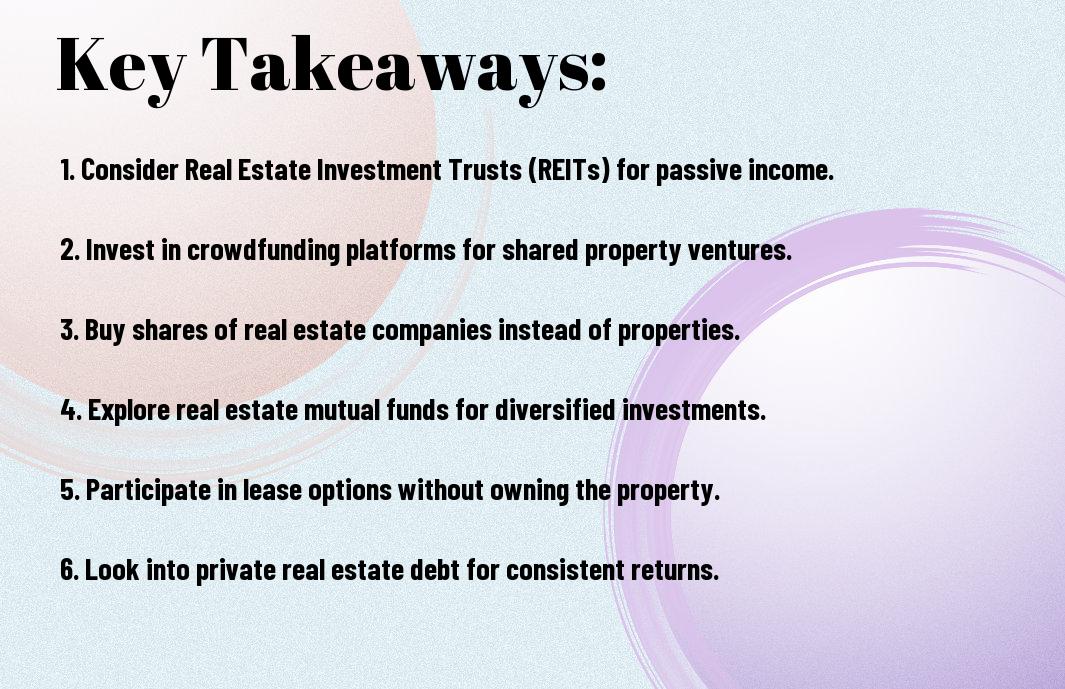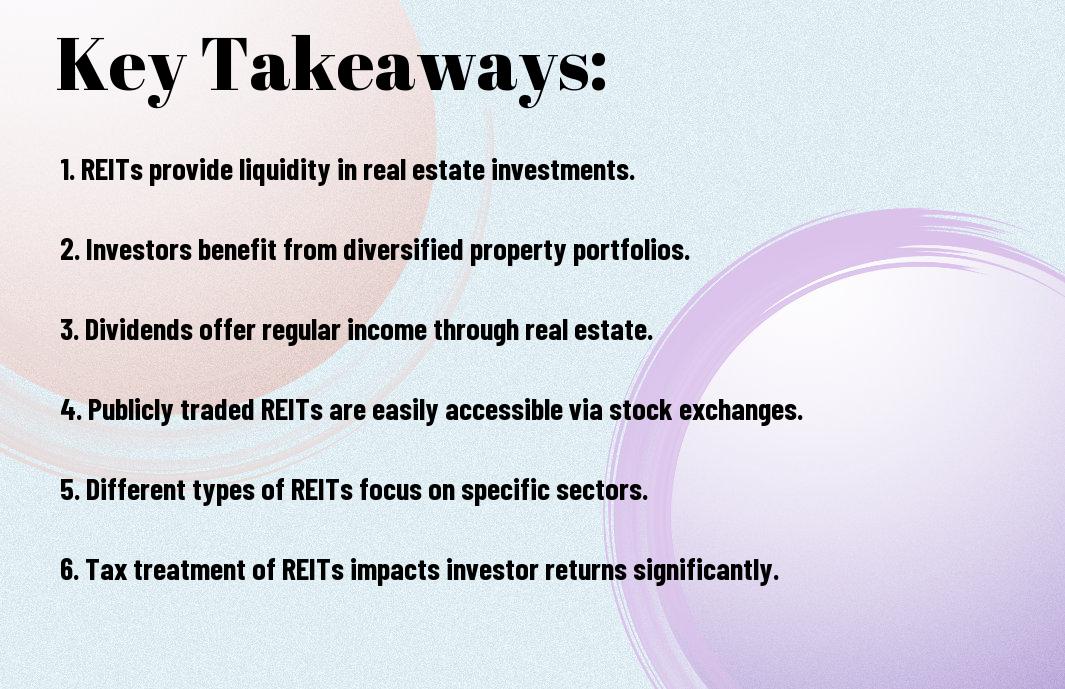Over the years, many investors have explored ways to profit from real estate without the responsibilities of owning property. If you are looking to expand your investment portfolio without the burdens of being a landlord, there are several strategies available to you. From real estate investment trusts (REITs) to crowdfunding platforms, you can look into the market while managing your risk effectively. For a comprehensive guide, check out this resource on How to Invest in Real Estate Without Being a Landlord.
Key Takeaways:
- Real Estate Investment Trusts (REITs): Consider investing in public or private REITs, which enable you to gain exposure to real estate markets without directly owning any property.
- Crowdfunding Platforms: Utilize real estate crowdfunding platforms that allow you to pool resources with other investors to finance property projects.
- Real Estate Mutual Funds: Invest in mutual funds that specialize in real estate, giving you diversified exposure to various properties and management companies.
- Private Equity Real Estate Funds: Explore private equity funds that focus on acquiring, developing, and managing real estate, which usually require a higher minimum investment.
- Real Estate Notes: Purchase real estate notes, which are loans secured by real estate, allowing you to earn interest without purchasing physical property.


Understanding Real Estate Investment
The world of real estate investment is vast and can be quite rewarding if approached correctly. It offers various avenues for earning income and building wealth without the need to own physical property. By learning how to navigate different investment strategies, you can leverage real estate’s potential for financial growth while managing your risks effectively.
What is Real Estate Investing?
Understanding real estate investing entails recognizing it as the process of utilizing real estate properties or services to generate financial returns. This could range from participating in property funds, real estate investment trusts (REITs), or engaging in crowdfunding platforms. The focus is on generating income or profit rather than acquiring tangible assets.
Key Terminology to Know
Around the landscape of real estate investing are terms that are important for you to grasp. These terms will help you communicate effectively and understand the various dynamics involved in the investment process, whether you are reading reports, engaging in discussions, or analyzing market trends.
Terminology such as ‘capital appreciation’, which refers to the increase in property value over time, and ‘cash flow’, indicating the income generated from the property after expenses, are just the beginning. Understanding terms like ‘diversification’, which involves spreading investments across various sectors, and ‘leverage’, which refers to using borrowed funds for investment, can greatly enhance your strategy. Familiarizing yourself with these phrases not only boosts your confidence but also empowers you to make informed decisions in your real estate investing journey.
Real Estate Investment Trusts (REITs)
Assuming you are looking to invest in real estate without the burden of property ownership, Real Estate Investment Trusts (REITs) present an attractive option. REITs allow you to invest in a portfolio of real estate assets through shares, making them a convenient way to gain exposure to the real estate market while generating passive income. With a diverse range of properties involved—from residential to commercial—REITs act as a bridge between you and real estate investment.
Types of REITs
Assuming you are interested in the various forms of REITs, here’s a breakdown of the primary types:
| Equity REITs | Invest primarily in income-generating properties. |
| Mortgage REITs | Provide financing for income-producing real estate by purchasing or originating mortgages. |
| Hybrid REITs | Combine investment in properties and mortgages. |
| Publicly Traded REITs | Shares are listed on stock exchanges, allowing easy buying and selling. |
| Private REITs | Not publicly traded, often limited to accredited investors. |
Recognizing the different types can help guide your investment strategy in REITs.
How to Invest in REITs
Between purchasing shares in a publicly traded REIT or investing in a private fund, you have various avenues to engage with REITs. The simplest method is to buy shares through your brokerage account, where you can trade them like stocks. Alternatively, you might consider mutual funds or ETFs that focus on REITs.
Investment in REITs can be straightforward and aligns well with your financial goals. Start by researching various REITs and their past performance, focusing on metrics like dividend yield and funds from operations. You can begin by investing with lower amounts than traditional property purchases, making it accessible for all investors. Diversifying your investment across different REIT types can also help spread your risk and improve your overall returns.
Real Estate Mutual Funds and ETFs
Your investment options in real estate extend beyond physical properties through mutual funds and exchange-traded funds (ETFs). These investment vehicles pool money from multiple investors to purchase a diversified portfolio of real estate-related assets, such as stocks of real estate companies or real estate investment trusts (REITs). This allows you to gain exposure to the real estate market without the responsibilities that come with property ownership.
Differences Between Funds and ETFs
Across mutual funds and ETFs, there are key differences to note. Mutual funds are typically actively managed and traded at the end of the trading day, while ETFs are generally passively managed and can be traded throughout the day like stocks. This affects liquidity, fees, and investment strategy, which you should consider based on your financial goals.
Benefits of Mutual Funds and ETFs
By investing in mutual funds and ETFs, you gain immediate diversification, as these funds invest in a variety of real estate assets. This spread can reduce your overall risk while enhancing potential returns, making it an appealing option for many investors looking to enter the real estate market without direct property investment.
In addition, mutual funds and ETFs often have lower minimum investment requirements compared to purchasing property outright, allowing you to start investing with a smaller capital. This accessibility, combined with the expertise of fund managers, enables you to leverage their knowledge and insights into real estate trends, further enhancing your investment strategy. You benefit from liquidity since ETFs can be traded at any time during market hours, giving you flexibility in managing your investments.
Real Estate Crowdfunding
To broaden your investment horizons, consider real estate crowdfunding as an innovative way to invest without owning physical property. This method allows you to pool your money with other investors to finance real estate projects, which can range from residential developments to commercial properties. By participating in crowdfunding, you can diversify your investment portfolio across various projects with relatively low capital contributions, making real estate investment accessible to more individuals.
How Crowdfunding Works
Any person looking to invest in real estate through crowdfunding typically joins a platform that connects investors with real estate developers. Once you find a project that interests you, you can invest a specific amount, often alongside many other investors. The crowdfunding platform manages the process, distributing returns based on the project’s performance, which could include rental income or profit from property sales.
Platforms for Real Estate Crowdfunding
Platforms designed for real estate crowdfunding offer a variety of opportunities to invest in properties without direct ownership. These platforms serve as intermediaries, connecting investors like you with real estate projects looking for funding, enabling a seamless investment experience.
Hence, the multitude of platforms available makes it easy for you to start investing in real estate. Some popular options include Fundrise, Realty Mogul, and Crowdstreet, each offering unique investment opportunities and varying fee structures. It’s wise to conduct thorough research to find a platform that aligns with your investment goals, risk tolerance, and desired returns. By understanding the specifics of different platforms, you can make informed choices that fit your investment strategy.
Notes and Real Estate Debt Investments
Many investors are turning to real estate notes and debt investments as a way to participate in the real estate market without buying physical property. By investing in these financial instruments, you can earn interest from mortgage payments without the responsibilities of property ownership, providing a unique opportunity for passive income.
Understanding Real Estate Notes
Against traditional property ownership, real estate notes are financial agreements that represent the promise to repay borrowed money secured by real estate. When you invest in these notes, you crucially become the lender, receiving payments and potentially benefiting from the property’s appreciation, depending on the terms of the note.
Risks and Rewards of Debt Investments
An investment in real estate debt can offer attractive returns and a lower barrier to entry compared to direct property investment. However, you should also be aware of associated risks, such as borrower default or changes in property value that affect the collateral backing your investment.
This investment method provides the potential for consistent income and can help diversify your portfolio. However, thorough research is necessary to evaluate the quality of the notes and the creditworthiness of borrowers. You should weigh the likelihood of borrower repayment against the potential returns to ensure a balanced investment strategy.
Tax Liens and Tax Deeds
Despite the common perception of real estate investment being solely about purchasing property, there are alternative methods such as investing in tax liens and tax deeds. This strategy allows you to acquire rights to a property without the necessity of direct ownership. Tax liens are claims against properties for unpaid taxes, while tax deeds are the actual properties sold at auction to recover owed taxes. Engaging in this route can provide you with opportunities to earn interest or even purchase properties at a fraction of their market value.
How Tax Lien Investing Works
After identifying properties with unpaid taxes, you can participate in tax lien auctions conducted by local governments. You will bid on the tax liens, and the winning bidder receives a certificate that represents the amount owed, along with the right to collect interest on that debt. If the property owner pays the owed taxes within a specified period, you earn interest, typically between 8% to 36%. If they don’t, you may have the opportunity to eventually acquire the property through foreclosure.
Potential Returns and Risks
Returns can be attractive when investing in tax liens, as you may earn significant interest on your investment alongside the chance of acquiring a property at a low cost. However, these investments come with inherent risks, such as the property owner not redeeming the lien, which can lead to potential legal complications or a property that may not be desirable.
Potential returns from tax lien investing are high, as you can regularly earn interest rates that are considerably more attractive than traditional savings or fixed-income investments. However, you must also weigh the risks associated with the properties tied to those liens. Properties may have other liens or issues, such as structural problems, which could hinder your anticipated return on investment. Being diligent in your research and understanding the local laws is key to mitigating these risks while maximizing your potential profits.
Final Words
Ultimately, investing in real estate without actually purchasing property opens up various avenues for you to grow your wealth. Whether you choose real estate REITs, crowdfunding, or mortgage notes, you can benefit from the real estate market while minimizing risks associated with direct ownership. This approach allows you to diversify your investment portfolio and gain exposure to real estate’s earning potential. By exploring these strategies, you can effectively participate in the real estate sector, tailor your investment strategy to fit your financial goals, and build your future with confidence.
FAQ
Q: What are some alternative methods to invest in real estate without directly buying property?
A: There are several ways to invest in real estate without purchasing physical property. One popular method is through Real Estate Investment Trusts (REITs), which allow individuals to buy shares in real estate portfolios that receive income from various properties. Additionally, crowdfunding platforms enable investors to pool their resources to fund real estate projects, offering the potential for returns without direct ownership. Lastly, consider investing in real estate-focused mutual funds or exchange-traded funds (ETFs) that provide exposure to a diversified set of real estate assets.
Q: What are the potential risks associated with investing in real estate without owning property?
A: Investing in real estate indirectly does come with certain risks. Market volatility can impact the performance of REITs and mutual funds, potentially leading to loss of value. Additionally, some crowdfunding platforms may lack regulatory oversight, so it’s important to thoroughly investigate the legitimacy and track record of any platform before investing. Lastly, illiquidity can be a factor, as some funds may have restrictions on when you can access your invested capital, unlike traditional stocks or bonds.
Q: How can I start investing in real estate without buying property if I have a limited budget?
A: Starting with a limited budget is very much feasible when it comes to indirect real estate investments. You can look into low-minimum investment options available through real estate crowdfunding platforms, where you may find opportunities to invest with amounts as low as $500 or $1,000. Additionally, consider exploring fractional ownership platforms, which allow you to own a share of a property along with other investors. Lastly, investing in REITs can be an effective way to enter the real estate market since many REITs have no minimum investment requirements and can be purchased via brokerage accounts just like stocks.




